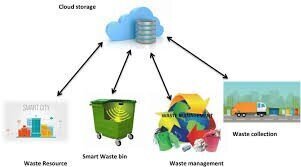Smart waste management is revolutionizing the way cities handle waste collection and recycling through the integration of advanced technologies like the Internet of Things (IoT) and artificial intelligence (AI). This innovative approach not only optimizes waste collection processes but also enhances sustainability and efficiency in urban environments.
Smart Waste Bins
At the heart of smart waste management are smart bins equipped with various sensors, including ultrasonic and weight sensors. These bins continuously monitor their fill levels and communicate this data in real-time to waste management systems. When a bin reaches a certain fill level, it sends an alert, allowing collection teams to prioritize their routes based on actual needs rather than fixed schedules[1][4].
IoT Integration
The integration of IoT technology allows for seamless communication between smart bins and waste management applications. This connectivity enables waste management companies to analyze data on waste generation patterns, optimize collection routes, and reduce unnecessary collection trips. By minimizing the number of stops made by collection trucks, cities can significantly lower their carbon emissions and operational costs[2][5].
AI and Data Analytics
AI algorithms play a crucial role in enhancing the capabilities of smart waste management systems. By analyzing data collected from smart bins, these algorithms can predict waste generation trends and optimize collection schedules. Additionally, AI can assist in sorting waste at recycling facilities, improving the efficiency of material recovery and increasing the value of recyclables[1][3].
Benefits of Smart Waste Management
-
Operational Efficiency: Smart bins reduce the need for manual checks, allowing waste collection teams to focus on bins that require immediate attention. This leads to more efficient use of resources and time.
-
Environmental Impact: By optimizing collection routes and reducing the frequency of waste collection, cities can decrease their carbon footprint and contribute to sustainability goals.
-
Enhanced Recycling: With better data on waste types and volumes, municipalities can implement targeted recycling programs, encouraging residents to recycle more effectively[2][4].
-
Cost Savings: The reduction in fuel consumption and labor costs associated with optimized waste collection routes can lead to significant financial savings for municipalities and waste management companies[5].
Future Trends
As technology continues to advance, the future of smart waste management looks promising. The ongoing development of machine learning and deep learning algorithms will further enhance the capabilities of smart bins, enabling more accurate waste classification and improved decision-making processes. Additionally, the integration of smart waste management systems with broader smart city initiatives will create a more connected and efficient urban environment[3][4].
In conclusion, smart waste management represents a significant shift towards more sustainable and efficient waste handling practices. By leveraging IoT and AI technologies, cities can improve their waste collection processes, enhance recycling efforts, and ultimately contribute to a cleaner and greener future.
Further Reading
1. Bins With Brains: IoT for Smarter Waste Management
2. Improving Waste Management With Smart Bins
3. Smart waste management: A paradigm shift enabled by artificial intelligence – ScienceDirect
4. Smart Bin and Smart Waste Management System: How IoT is Enhancing Waste Collection – IoT Marketing
5. Top 13 IoT Examples of Smart Waste Management – Freeeway


